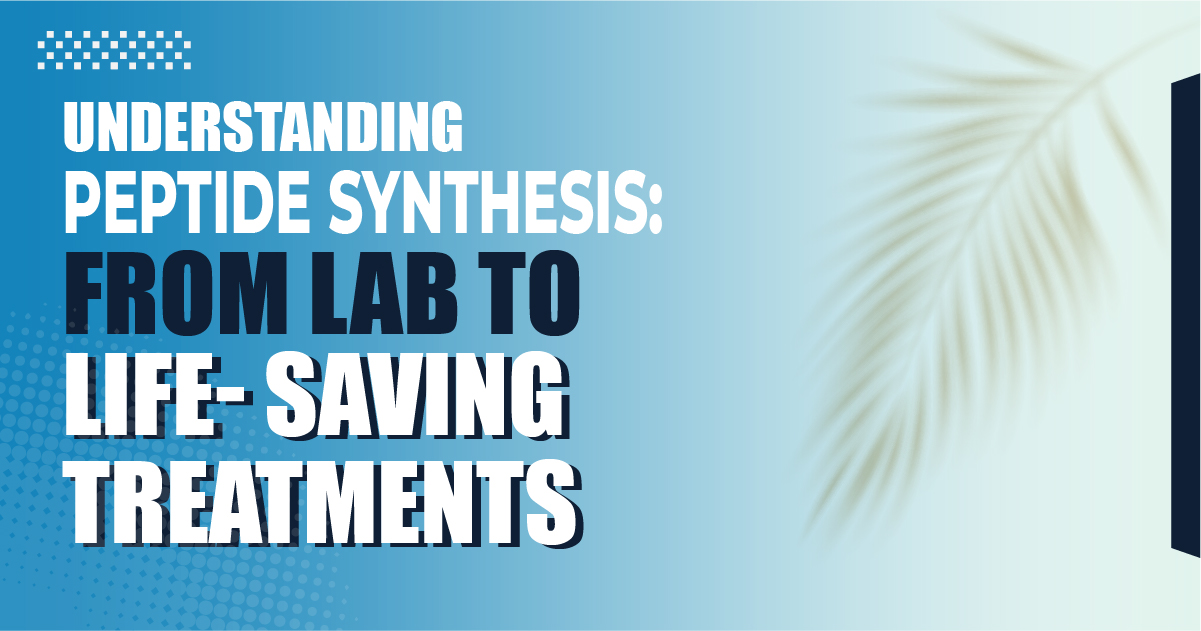Understanding Peptide Synthesis: From Lab to Life-Saving Treatments

Ever wonder how, in the field of medicine, a collection of little molecules may find heroism?
Meet peptides, tiny but powerful sequences of amino acids that change our treatment of illnesses, combat infections, and even slow down aging.
But from a lab notebook drawing to life-saving therapies, how precisely do these tiny marvels come to pass?
Let’s go from idea to treatment in the intriguing realm of peptide synthesis.
First Concerns First: Exactly Are Peptides?
See LEGO blocks. The building components are amino acids; a peptide results from their just the correct arrangement.
Though they are shorter than proteins—think of proteins as whole LEGO castles—their importance in our bodies cannot be discounted.
Like messengers, peptides direct all kinds of biological activities including metabolism, hormone control, immunity—you name it.
They are therefore celebrities in contemporary medicine.
The Science Underlying the Synthesis: How Peptides Are Made
Making peptides is not about combining elements in a beaker.
This is a careful, multi-stage procedure requiring significant scientific expertise. It looks like this:
- Design the Blueprint First
First, depending on the work the peptide must accomplish—target cancer cells, control blood sugar, increase collagen, etc.—scientists create the amino acid sequence.
Each amino acid counts.
- Create it Using Solid-Phase Peptide Synthesis (SPPS)
Designed by Nobel Prize winner Robert Bruce Merrifield, this is the gold standard of peptide synthesis.
- A solid resin bead functions much like a building site.
- One amino acid at a time, in the ideal sequence, is added.
- Everyone is “protected,” therefore it joins exactly and there is no molecular accident.
- The chain breaks off the resin and is “unmasked” after it is finished.
Pretty amazing, right?
- Test and Clear
We clean it up now.
Mass spectrometry and High-Performance Liquid Chromatography (HPLC) help the raw peptide be pure, strong, and just what we desire.
- Create and Execute
Peptides do not sit in a vial alone.
They are developed into lotions, injectables, nasal sprays—even dissolvable films.
Scientists look for stability, absorption, and bodily performance capabilities.
Actual Superpowers: The Power of Peptides
Peptides are real-world game changers, not just scientific fair projects.
Here is where they shine:
- Diabetes: GLP-1 receptor agonists control insulin levels.
- Cancer: Tumor-homing peptides direct medications to their proper target.
- Anti-aging: Peptides that enhance collagen help the skin to seem younger.
- Autoimmune Disorders: Immunomodulating peptides quiet hyperactive immune systems.
- Infectious Diseases: Viruses cannot proliferate under the action of antiviral peptides.
These are the contemporary medicinal Swiss Army knives.
The Difficulties (Because No Hero’s Path Is Simple)
Of course, things do not go completely according. The development of peptides involves several challenges:
- The body breaks down fragile molecules fast.
- Oral delivery is demanding. Normally, the digestive system breaks down peptides.
- Cost: Good synthesis and purification might be costly.
The interesting thing is that researchers—like us at Atomix Research—are daily addressing these problems.
New delivery technologies, peptide alterations, and stabilization methods are toughening, smartening, and lengthening peptides.
Atomix Research: Enabling the Peptide Revolution with Energy
Our obsession at Atomix Research is peptides.
We are innovation facilitators rather than just peptide manufacturers.
Whether you are a researcher investigating new therapeutic frontiers or a pharmaceutical business developing the next blockbuster treatment, we provide the best quality synthesis materials to let you confidently construct, test, and present your peptide discoveries.
In Summary
Peptides are little molecules with great promise despite their size.
More focused, safer, and usually more successful than conventional treatments, they are swiftly emerging as the direction of medicine.
From the initial flash of a concept to FDA-approved medicines, peptide synthesis is the quiet engine driving some of the most fascinating medical developments worldwide.
So the next time you hear “peptide,” consider possibilities, accuracy, and development rather than just a molecule.
Want to Work with Us or Learn More?
Contact Atomix Research right now to investigate our capabilities and see how we may drive your next peptide science invention.
